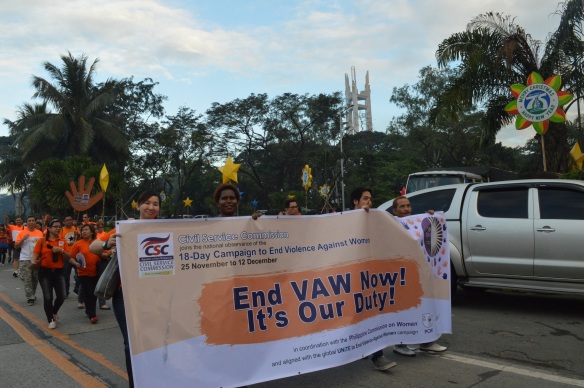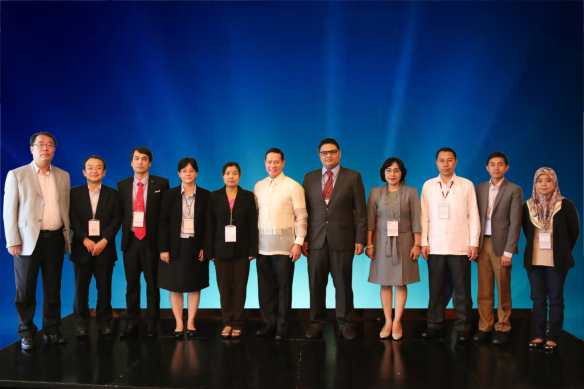The Civil Service Commission (CSC) supported the 2014 Walk to End Violence Against Women on Novermber 25, 2014 at the Quezon City Memorial Circle with CSC GADvocates (Gender and Development Advocates) joining over 5,000 participants from various government agencies.
The activity is one of the highlights of the 18-Day Campaign to End Violence Against Women (VAW) and their Children which started in November 25 and shall culminate on December 12. This year’s campaign revolve around the theme, “End Violence Against Women Now! It’s Our Duty” which highlights the crucial role of every ordinary Juan and Juana in ending VAW. The entire campaign is led by the Philippine Commission on Women (PCW) in coordination with national government agencies and non-government organizations.
CSC’s Role in Ending VAW
The CSC’s transformation journey marks its shift from transactional to strategic human resource management. The institution has achieved milestones in its pursuit to upgrade HR systems and make them at par with global HR standards. However, the persistence of sexual harassment in the workplace hinders the full development of HR in the Philippines.
Gender issues such as sexual harassment have been a concern of the CSC. As a response, the CSC has issued a number of initiatives to battle gender-based discrimination and violence. In 1994, CSC issued Memorandum Circular No. 19 entitled Anti-Sexual Harassment Policy in the Workplace. SH related cases are chronicled in the recently published Compendium on Sexual Harassment Volume 3. In 2005, the CSC issued Memorandum Circular No. 12, s. 2005 advocating the use of non-sexist language in all official documents, communications, and issuances in government.
In the course of gender mainstreaming, the CSC has continued to strengthen its connection with government agencies who are equally concerned with the same, such as the Philippine Commission on Women, Philippine National Police, Department of Justice, and the Department of the Interior and Local Government, among others.
As a member of the Inter-Agency Council on Violence Against Women and their Children, the CSC is tasked to find ways of creating environments that are safe from gender-based violence. It has actively participated in policy making, implementation, and advocacy initiatives with the Committee on Women and Gender Equality (CWGE), the Philippine Commission on Women (PCW), and other institutions on the enhancement of gender-related bills and policies, and in crafting the Women’s Empowerment, Development, and Gender Equality or Women’s EDGE Plan, which is a part of the Philippine Plan for Gender-Responsive Development (PPGRD).
The CSC also established the CSC Referral System on Violence Against Women and their Children. Implemented nationwide, it aims to strengthen GAD mechanisms and support system for employee victim-survivors of gender-based violence. This move ensures their recovery and reintegration. This program also serves to strengthen partnerships within different government entities keen to support anti-VAWC efforts, especially in the workplace.
The gender dimension has been integrated in the career service examinations through test questions and in Program to Institutionalize Meritocracy and Excellence in Human Resource Management (PRIME-HRM) through gender-based indicators.n



